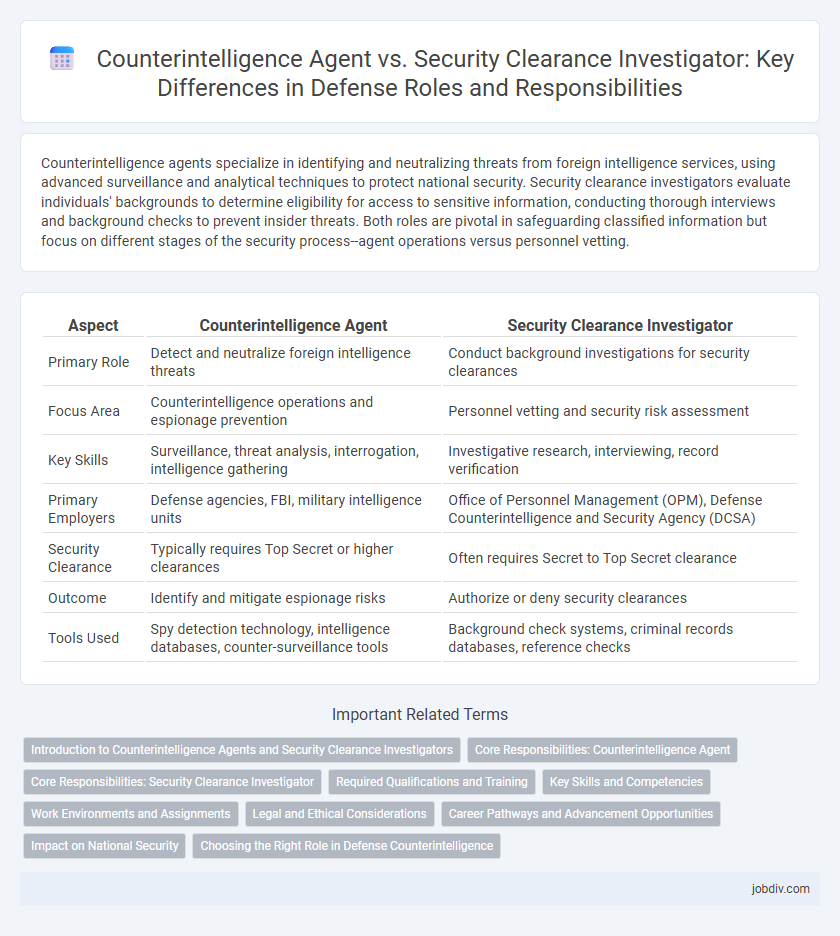Counterintelligence agents specialize in identifying and neutralizing threats from foreign intelligence services, using advanced surveillance and analytical techniques to protect national security. Security clearance investigators evaluate individuals' backgrounds to determine eligibility for access to sensitive information, conducting thorough interviews and background checks to prevent insider threats. Both roles are pivotal in safeguarding classified information but focus on different stages of the security process--agent operations versus personnel vetting.
Table of Comparison
| Aspect | Counterintelligence Agent | Security Clearance Investigator |
|---|---|---|
| Primary Role | Detect and neutralize foreign intelligence threats | Conduct background investigations for security clearances |
| Focus Area | Counterintelligence operations and espionage prevention | Personnel vetting and security risk assessment |
| Key Skills | Surveillance, threat analysis, interrogation, intelligence gathering | Investigative research, interviewing, record verification |
| Primary Employers | Defense agencies, FBI, military intelligence units | Office of Personnel Management (OPM), Defense Counterintelligence and Security Agency (DCSA) |
| Security Clearance | Typically requires Top Secret or higher clearances | Often requires Secret to Top Secret clearance |
| Outcome | Identify and mitigate espionage risks | Authorize or deny security clearances |
| Tools Used | Spy detection technology, intelligence databases, counter-surveillance tools | Background check systems, criminal records databases, reference checks |
Introduction to Counterintelligence Agents and Security Clearance Investigators
Counterintelligence agents specialize in identifying, assessing, and neutralizing threats posed by foreign intelligence services, focusing on protecting national security from espionage and sabotage. Security clearance investigators conduct thorough background checks and evaluate an individual's loyalty, trustworthiness, and reliability to determine eligibility for access to classified information. Both roles are critical in safeguarding sensitive defense information, but counterintelligence agents focus on external threats while security clearance investigators concentrate on internal personnel vetting.
Core Responsibilities: Counterintelligence Agent
Counterintelligence agents specialize in identifying and neutralizing foreign intelligence threats by conducting surveillance, investigations, and analysis of potential espionage activities. They gather and assess sensitive information to protect national security assets and prevent unauthorized access or sabotage. Their core responsibilities also include collaborating with law enforcement and intelligence agencies to thwart covert operations and insider threats.
Core Responsibilities: Security Clearance Investigator
Security Clearance Investigators conduct thorough background checks on individuals seeking access to classified information, verifying employment history, criminal records, financial status, and foreign contacts. They collect and analyze personal data to assess trustworthiness, potential vulnerabilities, and risks of espionage or unauthorized disclosures. Their investigations support national security by ensuring only reliable personnel obtain security clearances.
Required Qualifications and Training
Counterintelligence agents require specialized training in threat assessment, foreign intelligence tactics, and covert operations, often involving completion of advanced courses at agencies such as the FBI or CIA. Security Clearance Investigators typically need expertise in personnel evaluation, background investigation procedures, and knowledge of federal regulations, which they acquire through formal training programs and on-the-job experience. Both roles demand strong analytical skills and adherence to Department of Defense standards, but counterintelligence agents undergo more intensive operational and field training.
Key Skills and Competencies
Counterintelligence Agents excel in threat detection, covert operations, and intelligence analysis, emphasizing skills in counterespionage, surveillance, and risk assessment to protect national security. Security Clearance Investigators specialize in background investigations, interviewing techniques, and evaluating psychological, financial, and criminal histories to ensure personnel reliability. Both roles require strong analytical abilities, attention to detail, discretion, and knowledge of federal regulations and security protocols crucial for safeguarding classified information.
Work Environments and Assignments
Counterintelligence Agents typically operate in dynamic environments that include field investigations, surveillance operations, and coordination with military or intelligence agencies, often deployed in sensitive or high-risk locations. Security Clearance Investigators work primarily in office settings or government facilities, conducting background checks, interviews, and data analysis to assess individuals' suitability for security clearances. Both roles require access to classified information but differ in assignment scope, with Counterintelligence Agents focusing on threat detection and Security Clearance Investigators on vetting personnel.
Legal and Ethical Considerations
Counterintelligence agents operate under strict legal frameworks to identify and neutralize espionage threats, ensuring national security while respecting constitutional protections. Security clearance investigators focus on thorough background checks to prevent insider threats, adhering to privacy laws and ethical standards in handling sensitive personal information. Both roles must balance the necessity of safeguarding classified data with compliance to federal regulations and individual rights.
Career Pathways and Advancement Opportunities
Counterintelligence agents typically advance by gaining field experience in identifying and neutralizing threats, often moving into senior analyst or supervisory roles within intelligence agencies. Security clearance investigators progress by developing expertise in conducting thorough background checks and risk assessments, enabling promotion to lead investigator or quality assurance positions in government or private sectors. Career growth for both roles depends on obtaining higher-level certifications, specialized training, and demonstrating proficiency in handling sensitive national security information.
Impact on National Security
Counterintelligence Agents play a crucial role in identifying and neutralizing espionage threats, directly safeguarding classified military operations and sensitive intelligence from foreign adversaries. Security Clearance Investigators support national security by rigorously vetting personnel, ensuring that only trustworthy individuals access classified information and critical defense systems. Both roles are essential in maintaining the integrity of national defense by preventing insider threats and minimizing vulnerabilities within security frameworks.
Choosing the Right Role in Defense Counterintelligence
Counterintelligence agents specialize in identifying and neutralizing foreign intelligence threats, employing advanced surveillance and analysis techniques to protect national security. Security clearance investigators focus on vetting personnel through comprehensive background checks, ensuring trustworthiness and reliability within sensitive positions. Selecting the right role depends on whether the priority is active threat detection or meticulous personnel evaluation within defense counterintelligence operations.
Counterintelligence Agent vs Security Clearance Investigator Infographic

 jobdiv.com
jobdiv.com